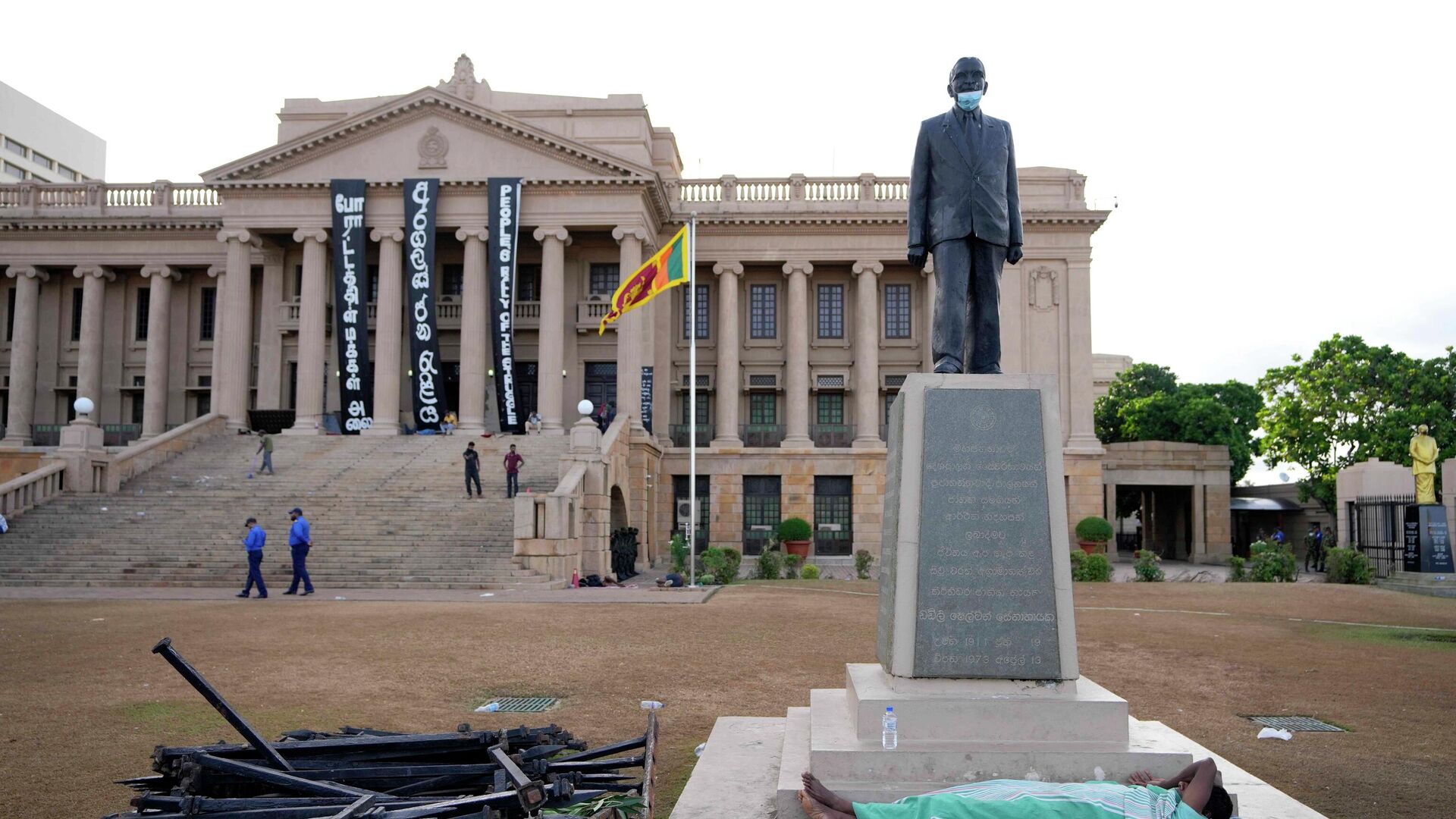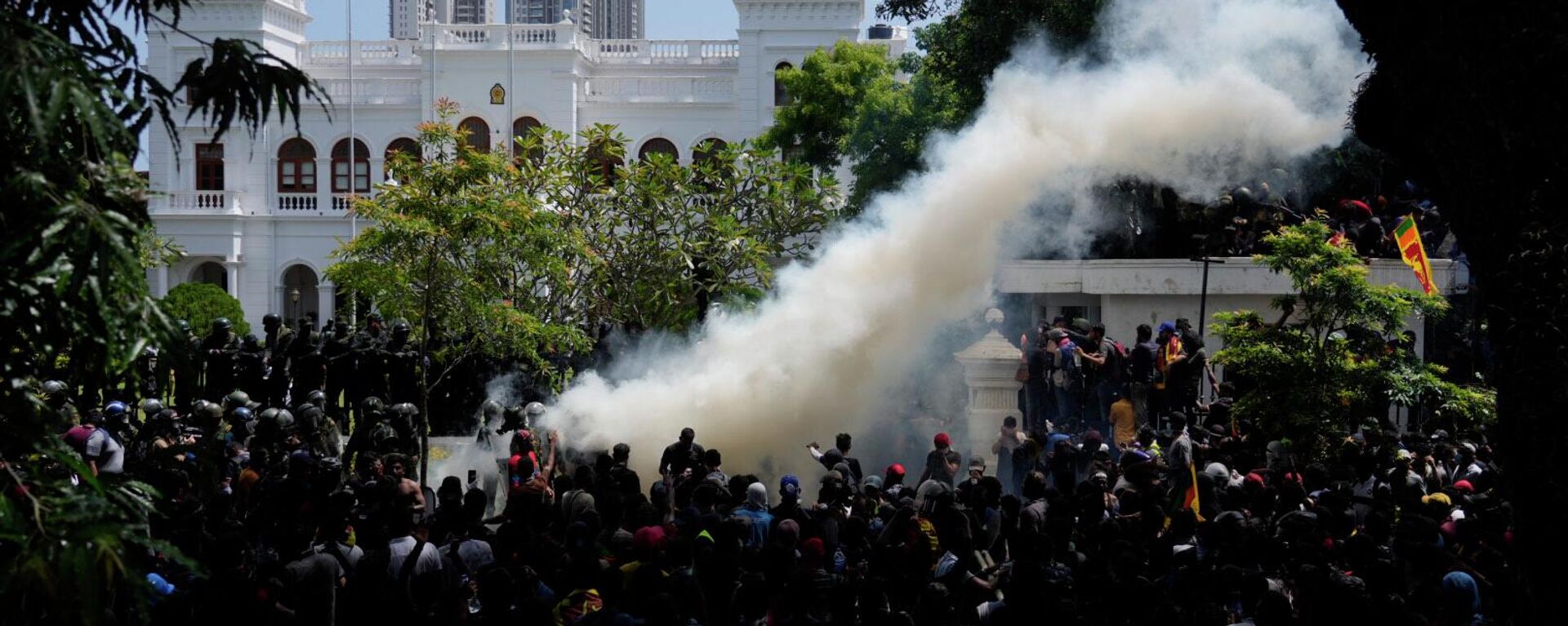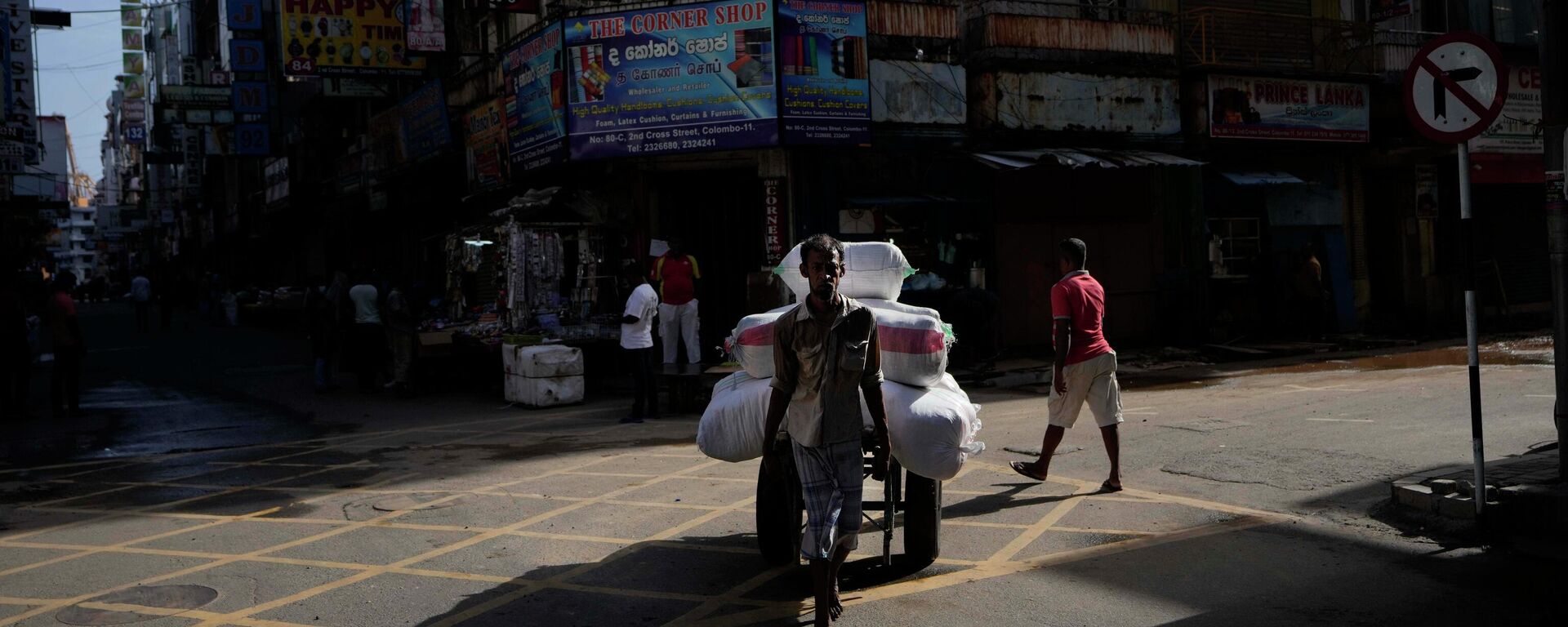https://sputnikglobe.com/20220715/restoring-economic-stability-is-a-priority-experts-weigh-in-on-what-lies-ahead-for-sri-lanka-1097306726.html
Restoring Economic Stability is a Priority: Experts Weigh in on What Lies Ahead for Sri Lanka
Restoring Economic Stability is a Priority: Experts Weigh in on What Lies Ahead for Sri Lanka
Sputnik International
Facing its worst economic crisis since independence in 1948, Sri Lanka has been thrown into another round of political turmoil, with protesters taking over the... 15.07.2022, Sputnik International
2022-07-15T13:27+0000
2022-07-15T13:27+0000
2022-10-19T18:35+0000
sri lanka
imf
gotabaya rajapaksa
ranil wickremesinghe
analysis
asia
https://cdn1.img.sputnikglobe.com/img/07e6/07/0f/1097354605_0:0:3071:1728_1920x0_80_0_0_7ce92ddac5594b8cdb0153fb48bd5f11.jpg
Ex-President Gotabaya Rajapaksa’s flight from the country in the wee hours of July 12 has created a “political vacuum” that can only be filled through fresh parliamentary elections, experts told Sputnik.Manivannan is also a distinguished fellow at the Chennai city-based national security think tank Peninsula Foundation.Possible Contenders for Sri Lanka's Next PresidentLeader of opposition Sajith Premadasa and Ranil Wickremesinghe have both announced that they will be contesting the July 20 presidential vote, in which the 225-member parliament will choose the country's next leader. Premadasa heads the Samagi Jana Balawegaya, a political group with 54 MPs in the Sri Lankan parliament. Manivannan also reckons that the next president must hold a fresh parliamentary election as soon as possible so as not to spark another round of protests.“It won’t be right for the next president to try and complete the remainder of the term till 2024 (when next elections in Sri Lanka are scheduled),” the academic says.As far as Wickremesinghe is concerned, Manivannan warns that "protesters won't accept him as the next president."However, Sri Lanka Podujana Peramuna (SLPP), the party led by former Prime Minister Mahinda Rajapaksa, has said that it would back Wickremesinghe's presidential bid. The SLPP commands an overwhelming majority in the 225-member parliament.Despite the fact that Wickremesinghe’s United National Party (UNP) has only one MP in the parliament, he still managed to be appointed as prime minister in May due to the backing of SLPP MPs.“One has to wait and see what transpires at the voting on July 20,” the former Indian diplomat says.Restoring Economic Stability is More Important Than Political Stability, Says Ex-EnvoyTrigunayat further suggests that a “sufficient infusion of aid” from overseas must be the priority for foreign governments and organizations, including the International Monetary Fund (IMF).The fresh round of violent protests and the departure of President Rajapaksa from the country has put a spanner in the works of ongoing negotiations between Colombo and the IMF. Meanwhile, financial experts have reckoned that structural reforms suggested by the IMF are crucial if Sri Lanka wants any bilateral assistance from a foreign government.So far, India has been the only country that has stepped forward to Colombo's help, having extended a relief package of over $3.8 billion.The IMF on Sunday, July 10 called for a resolution of the political crisis in Sri Lanka in order to facilitate the “resumption” of bailout talks for an Extended Fund Facility (EFF).“Restoring economic stability right now is more important than political stability,” the ex-Indian envoy states, adding that it would contribute to "easing of the political protests."The shortage of fuel, food, and other essentials due to the balance of payments (BOP) crisis led to a record inflation of 55 percent in June. Fuel shortages, in their turn, have led to power cuts, industries shutting down, as well schools being closed in the island nation.The UN-backed World Food Program (WFP) warned last week that over six million Sri Lankans, or almost one fourth of the country’s population, are facing food insecurity on account of the economic crisis.The WFP also said that around 61 percent of Sri Lankan households have cut down on their meals to cope with the current situation.Want to know more? Check out our Koo & Telegram accounts!Koo: https://www.kooapp.com/profile/sputniknewsSputnik India: https://t.me/sputniknewsindia
https://sputnikglobe.com/20220713/sri-lanka-president-reportedly-appoints-prime-minister-as-acting-president-1097258741.html
https://sputnikglobe.com/20220701/implementing-imf-reforms-in-sri-lanka-will-be-painful-but-they-are-essential-says-policy-analyst-1096861116.html
sri lanka
Sputnik International
feedback@sputniknews.com
+74956456601
MIA „Rossiya Segodnya“
2022
News
en_EN
Sputnik International
feedback@sputniknews.com
+74956456601
MIA „Rossiya Segodnya“
Sputnik International
feedback@sputniknews.com
+74956456601
MIA „Rossiya Segodnya“
sri lanka, imf, gotabaya rajapaksa, ranil wickremesinghe, analysis
sri lanka, imf, gotabaya rajapaksa, ranil wickremesinghe, analysis
Restoring Economic Stability is a Priority: Experts Weigh in on What Lies Ahead for Sri Lanka
13:27 GMT 15.07.2022 (Updated: 18:35 GMT 19.10.2022) Facing its worst economic crisis since independence in 1948, Sri Lanka has been thrown into another round of political turmoil, with protesters taking over the homes and offices of ex-President Gotabaya Rajapaksa and former PM Ranil Wickremesinghe, who is now serving as acting president. All parties are slated to decide the next leader on July 20.
Ex-President Gotabaya Rajapaksa’s
flight from the country in the wee hours of July 12 has created a “political vacuum” that can only be filled through fresh parliamentary elections, experts told Sputnik.
“The problem is that the protesters don’t trust any political party. While the Rajapaksas no longer control power, it hasn’t gone to anyone as of now,” reckons Professor Ramu Manivannan, who heads the Department of Politics and Public Administration at the University of Madras in India.
Manivannan is also a distinguished fellow at the Chennai city-based national security think tank Peninsula Foundation.
Possible Contenders for Sri Lanka's Next President
Leader of opposition Sajith Premadasa and Ranil Wickremesinghe have both announced that they will be contesting the July 20 presidential vote, in which the 225-member parliament will choose the country's next leader.
Manivannan believes that the “best option” for Sri Lanka to restore political stability is to appoint leader of opposition Sajith Premadasa as caretaker president.
Premadasa heads the Samagi Jana Balawegaya, a political group with 54 MPs in the Sri Lankan parliament.
Manivannan also reckons that the next president must hold a fresh parliamentary election as soon as possible so as not to spark another round of protests.
“It won’t be right for the next president to try and complete the remainder of the term till 2024 (when next elections in Sri Lanka are scheduled),” the academic says.
As far as Wickremesinghe is concerned, Manivannan warns that "protesters won't accept him as the next president."
Manivannan notes that violent the protests against Wickremesinghe, who has been appointed as "acting president," shows that the Sri Lankan public hasn’t agreed to the “unscrupulous handing over of power.”
However, Sri Lanka Podujana Peramuna (SLPP), the party led by former Prime Minister Mahinda Rajapaksa, has said that it would back Wickremesinghe's presidential bid. The SLPP commands an overwhelming majority in the 225-member parliament.
Despite the fact that Wickremesinghe’s United National Party (UNP) has only one MP in the parliament, he still managed to be appointed as prime minister in May due to the backing of SLPP MPs.
Ambassador Anil Trigunayat, a former Indian envoy and currently a distinguished fellow at the New Delhi-based think tank Vivekananda International Foundation (VIF), underlines that in spite of Rajapaksa leaving the nation, the SLPP wields a significant say in the parliament owing to its landslide victory in the last parliamentary elections in 2020.
“One has to wait and see what transpires at the voting on July 20,” the former Indian diplomat says.
Restoring Economic Stability is More Important Than Political Stability, Says Ex-Envoy
Trigunayat further suggests that a “sufficient infusion of aid” from overseas must be the priority for foreign governments and organizations, including the International Monetary Fund (IMF).
The fresh round of violent protests and the departure of President Rajapaksa from the country has put a spanner in the works of ongoing negotiations between Colombo and the IMF. Meanwhile, financial experts have reckoned that structural reforms suggested by the IMF are crucial if Sri Lanka wants any bilateral assistance from a foreign government.
So far, India has been the only country that has stepped forward to Colombo's help, having extended a relief package of over $3.8 billion.
The IMF on Sunday, July 10 called for a resolution of the political crisis in Sri Lanka in order to facilitate the “
resumption” of bailout talks for an Extended Fund Facility (EFF).
“The economic conditions in Sri Lanka are currently not ideal to implement the structural changes being suggested by the IMF before it agrees to a bailout package. The IMF must extend a bridging loan to Sri Lanka so that people are at least able to resume their normal lives,” Trigunayat says.
“Restoring economic stability right now is more important than political stability,” the ex-Indian envoy states, adding that it would contribute to "easing of the political protests."
The shortage of fuel, food, and other essentials due to the balance of payments (BOP) crisis led to a record inflation of 55 percent in June. Fuel shortages, in their turn, have led to power cuts, industries shutting down, as well schools being closed in the island nation.
The UN-backed World Food Program (WFP) warned last week that over six million Sri Lankans, or almost one fourth of the country’s population, are facing food insecurity on account of the economic crisis.
The WFP also said that around 61 percent of Sri Lankan households have cut down on their meals to cope with the current situation.
Want to know more? Check out our Koo & Telegram accounts!




